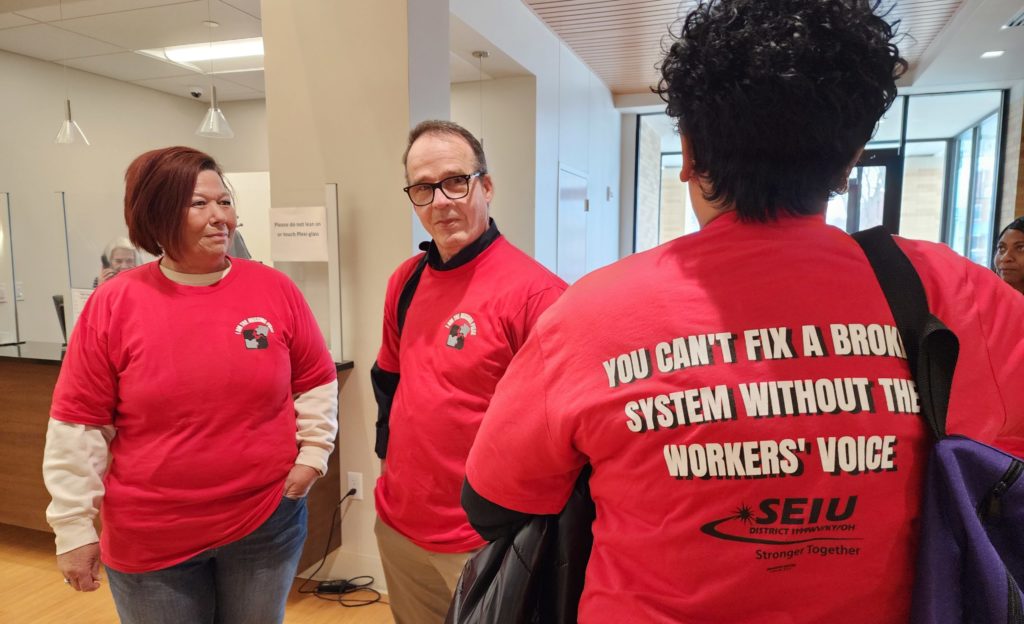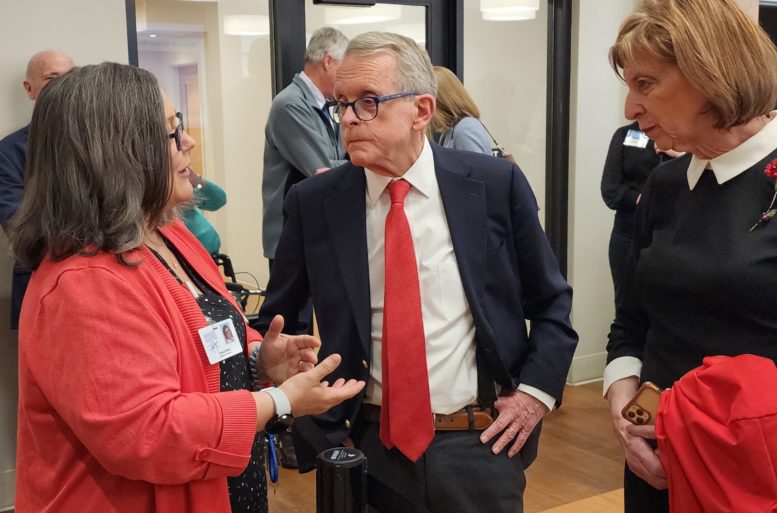By JAN LARSON McLAUGHLIN
BG Independent News
Family members with parents or spouses in nursing homes nodded their heads knowingly Tuesday as they listened to the all-too-common stories of inadequate care for their loved ones.
For some, the emotions were very raw as they talked about being given 24 hours to find a facility for their loved ones, about running into brick walls when they complained about care, and about being ill-prepared when thrust into the role of advocate.
On Tuesday, they were given a chance to tell the state how it could improve nursing home care in Ohio, which has more than 960 such facilities and 2.8 million residents over the age of 65.
After receiving “gut-wrenching” letters from families and learning Ohio’s nursing homes ranked 39th in terms of quality by the Centers for Medicare and Medicaid Services, Gov. Mike DeWine is on a reconnaissance mission across the state.

The Ohio Governor’s Nursing Home Quality and Accountability Task Force visited the Wood County Senior Center in Bowling Green for its next stop in a statewide series of listening sessions to hear from community members about the quality of care being provided in the state’s nursing homes.
Members of the public – including nursing home residents, their caregivers and loved ones, nursing facility staff members, administrators, ombudsmen, and others with an interest in Ohio’s nursing homes were encouraged to make their voices heard.
“We have an opportunity to make a real difference in nursing homes,” said Ursel J. McElroy, chair of the Nursing Home Quality and Accountability Task Force and director of the Ohio Department of Aging. “We are hearing from as many people as we can across Ohio.”
Also attending the meeting were members of SEIU 1199, the union representing nursing home workers. Members expressed their frustration about not having a place at the table in the task force conversations about improving nursing home care in Ohio.
One nursing home staff member talked about the importance of adequate staffing – so one person is not assigned the care of 20 patients. Nursing home workers are leaving the industry in droves due to lack of respect, unsafe staffing levels and low wages – creating a 25% shortage of nursing home workers, the union said.

The families talked about the qualities that are important in nursing homes – staff retention, good food, adherence to a patient bill of rights, good hygiene, activities that are physically and mentally stimulating, and providing pain free care as much as possible.
Families were asked about their experiences selecting a nursing home.
“It’s a nightmare,” said one woman, whose mom was hospitalized after a fall, and discharged when she ran out of money. “I became an accidental advocate for Mom.”
Dr. Nancy Orel, who taught gerontology for years at BGSU, thought she knew how to select a facility for her mom.
“I assumed I was knowledgeable,” but she found the task overwhelming. “I had to be an advocate for my mother,” at the hospital, at the nursing home, with insurance companies, Orel said.
A director of nursing at a facility expressed her empathy for families not accepted for care. She explained that insurance only pays for certain expenses, and most “great facilities” have long waiting lists.
Discharge planning for older adults should begin as soon as the patient gets to the hospital for care after a fall or other injury, she added. The patient and family should not be informed when they have 24 hours to find a facility that fits their needs.

Multiple family members voiced frustration over the inefficient and non-transparent complaint process for nursing homes in Ohio. One woman, who wanted to file a complaint against a doctor she said over-medicated her husband, said she spent 2½ weeks and talked to 12 different people before she found the right place to complain.
It can be complicated, McElroy said, with different complaints being taken at different offices, like the Ohio Department of Aging, Ohio Department of Health, the State Ombudsman Office, and the Ohio Attorney General’s Office.
It shouldn’t be that hard to point out problems and ask for accountability, family members said.
“I just want to be a daughter,” one woman said. “We’re all going to be there someday. This is just how we treat the least among us.”
Another family member said she filed numerous complaints against the nursing home where her mother lived for six years. She said the facility retaliated against her mom and tried to evict her.
Yet another said she filed a complaint against a nursing home for an injury. The facility said it wasn’t substantiated – though the abuse was caught on camera, she said. Others mentioned bruises on their loved ones, but facilities not documenting the injuries so they didn’t have to take responsibility.
One man suggested that because the consequences aren’t enough to hit facilities in the pocketbook, “you’re left with the same problems, over and over and over.”
The task force is charged with coming up with an actionable report on the quality of care in nursing homes by May 26, according to McElroy. That will be the first of many steps to improve care, she said.
“We want every resident to be treated with the dignity and humanity we all want, every day,” McElroy said.

